Palliative Care Provision and Advanced Care Directives in Aged Care
VerifiedAdded on 2023/03/23
|14
|4285
|54
Report
AI Summary
This report provides an analysis of palliative care provision in residential aged care, critically discussing advanced care directives (ACDs) and strategies to improve palliative care services. It highlights the importance of residential care for aged individuals with acute and chronic conditions, emphasizing evidence-based practices and affordable, accessible healthcare. The report underscores the role of ACDs in empowering patients to make informed decisions about their care, aligning with ethical standards like autonomy, respect, and honesty. It also explores linkage strategies to improve teamwork and communication among healthcare professionals, ultimately enhancing patient outcomes and promoting quality of life for the aged in residential care facilities. The Australian Aged Care Act of 1997 is mentioned in the report for protecting the needs of the aged.
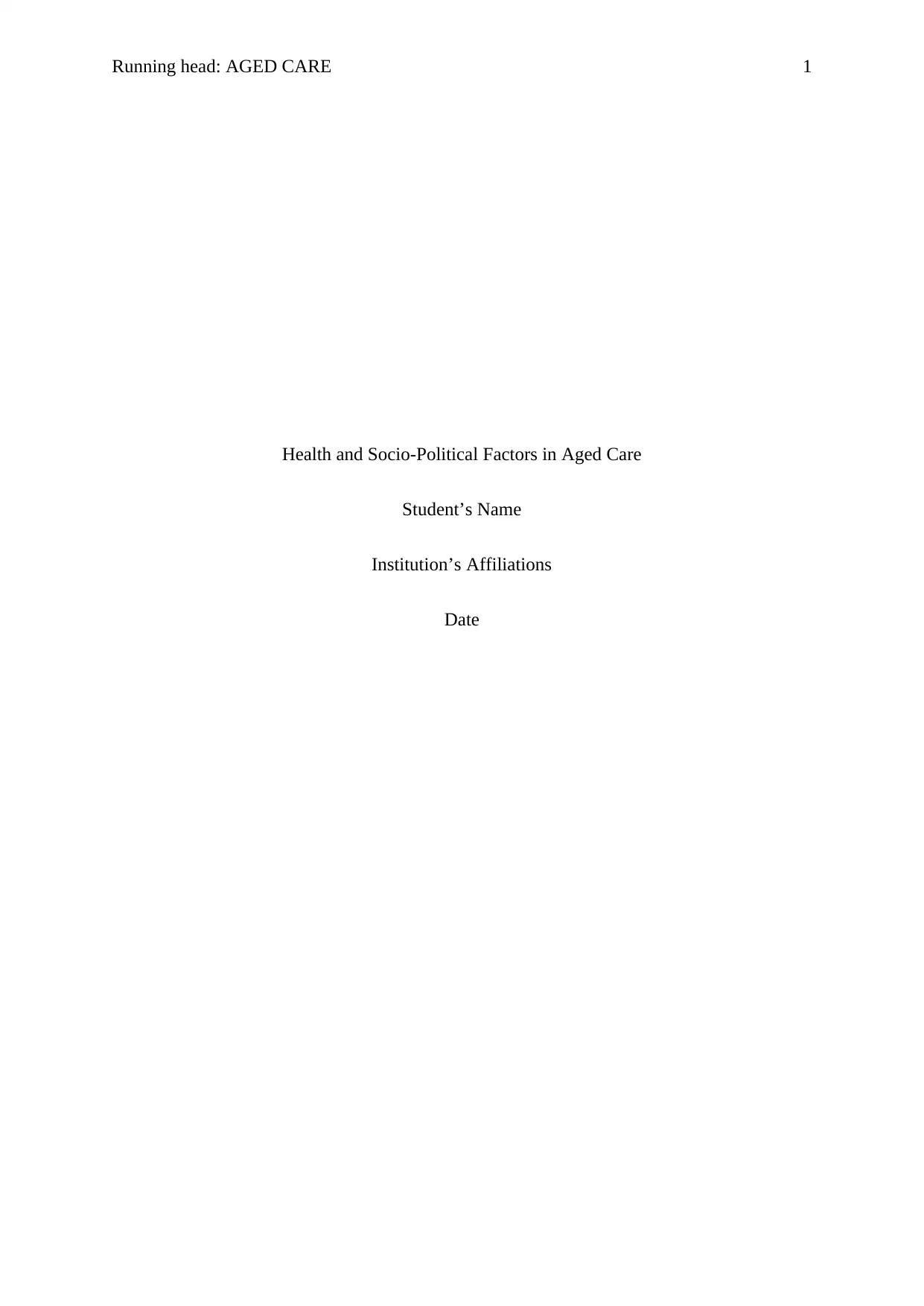
Running head: AGED CARE 1
Health and Socio-Political Factors in Aged Care
Student’s Name
Institution’s Affiliations
Date
Health and Socio-Political Factors in Aged Care
Student’s Name
Institution’s Affiliations
Date
Paraphrase This Document
Need a fresh take? Get an instant paraphrase of this document with our AI Paraphraser
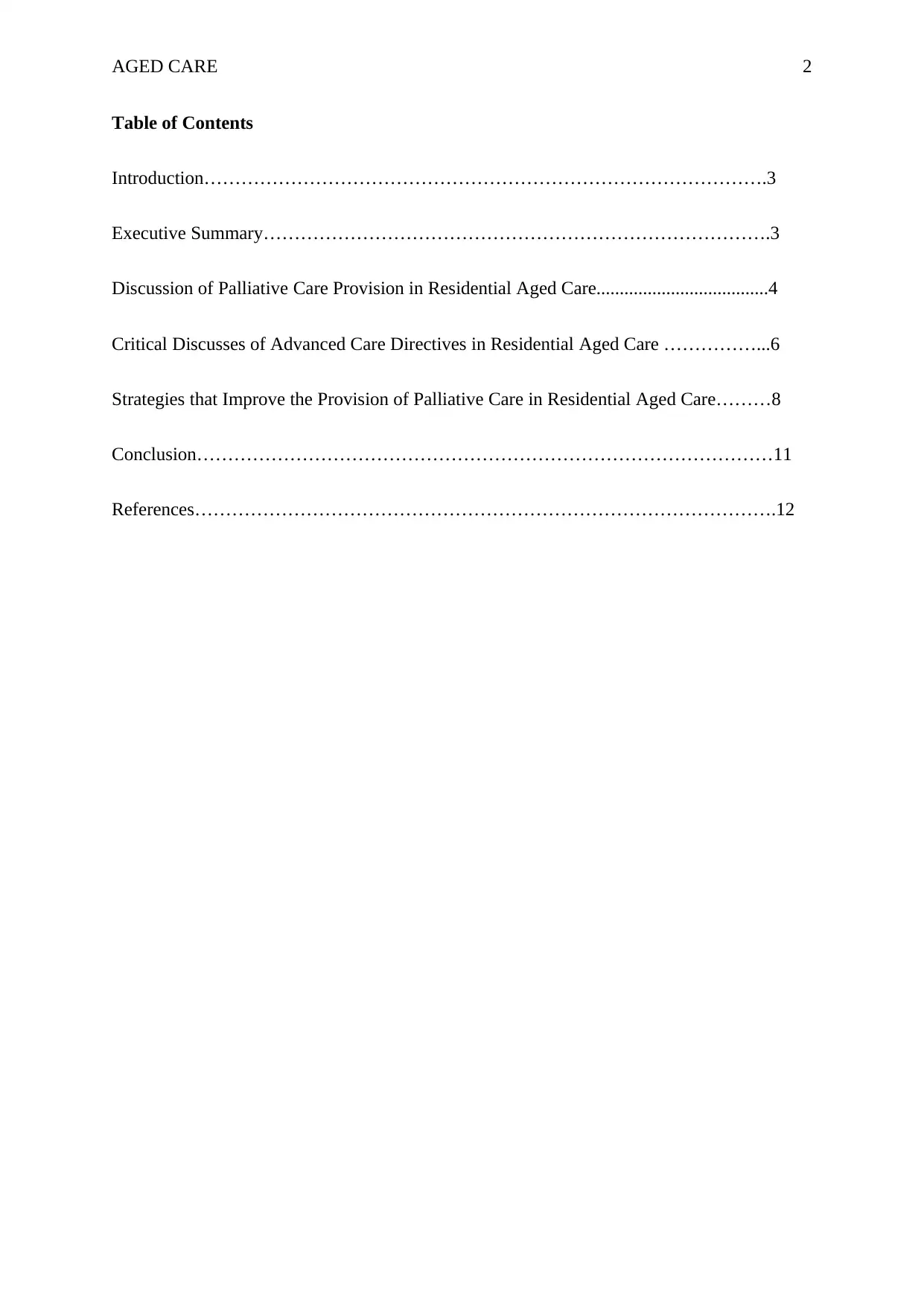
AGED CARE 2
Table of Contents
Introduction……………………………………………………………………………….3
Executive Summary……………………………………………………………………….3
Discussion of Palliative Care Provision in Residential Aged Care.....................................4
Critical Discusses of Advanced Care Directives in Residential Aged Care ……………...6
Strategies that Improve the Provision of Palliative Care in Residential Aged Care………8
Conclusion…………………………………………………………………………………11
References………………………………………………………………………………….12
Table of Contents
Introduction……………………………………………………………………………….3
Executive Summary……………………………………………………………………….3
Discussion of Palliative Care Provision in Residential Aged Care.....................................4
Critical Discusses of Advanced Care Directives in Residential Aged Care ……………...6
Strategies that Improve the Provision of Palliative Care in Residential Aged Care………8
Conclusion…………………………………………………………………………………11
References………………………………………………………………………………….12
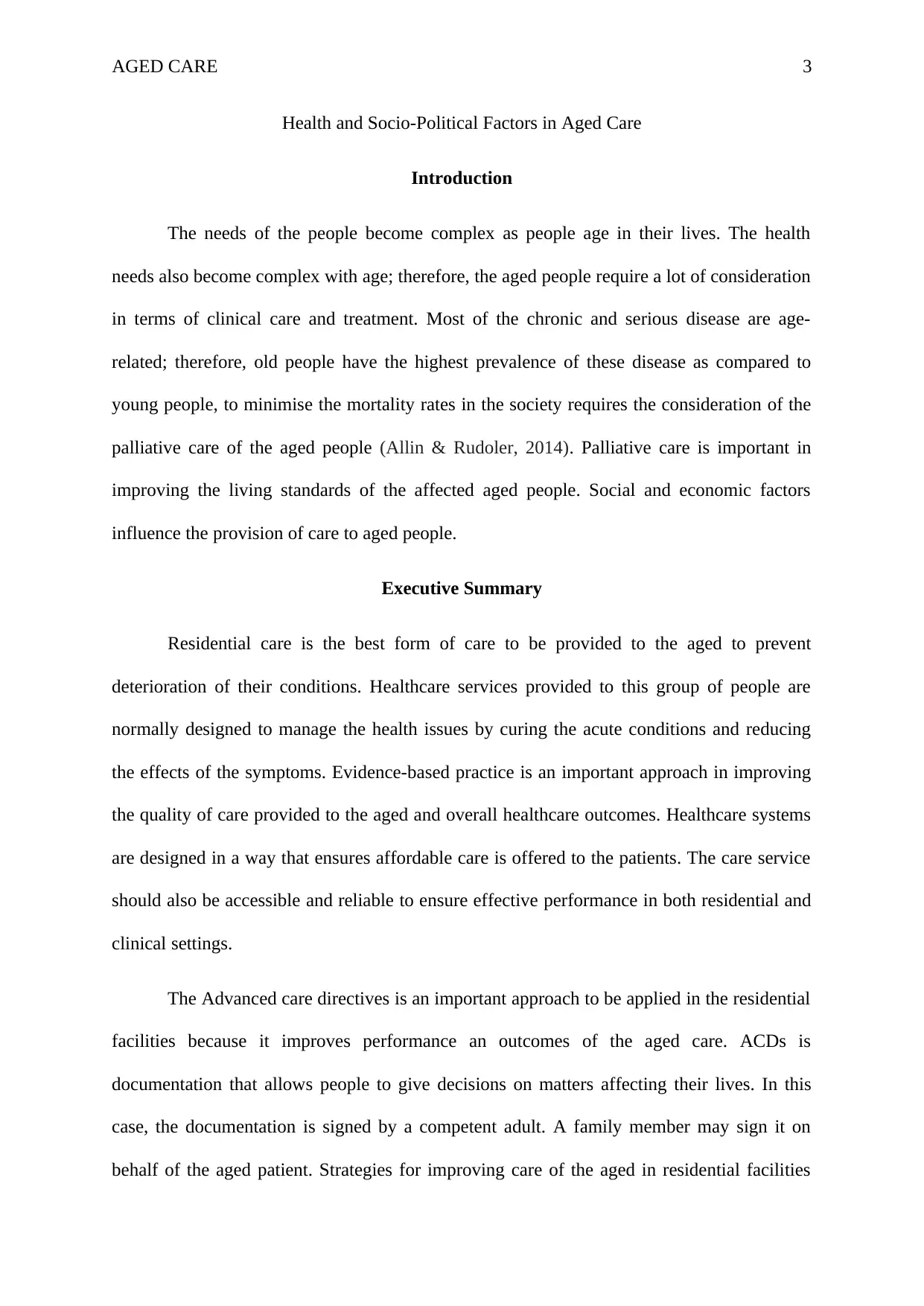
AGED CARE 3
Health and Socio-Political Factors in Aged Care
Introduction
The needs of the people become complex as people age in their lives. The health
needs also become complex with age; therefore, the aged people require a lot of consideration
in terms of clinical care and treatment. Most of the chronic and serious disease are age-
related; therefore, old people have the highest prevalence of these disease as compared to
young people, to minimise the mortality rates in the society requires the consideration of the
palliative care of the aged people (Allin & Rudoler, 2014). Palliative care is important in
improving the living standards of the affected aged people. Social and economic factors
influence the provision of care to aged people.
Executive Summary
Residential care is the best form of care to be provided to the aged to prevent
deterioration of their conditions. Healthcare services provided to this group of people are
normally designed to manage the health issues by curing the acute conditions and reducing
the effects of the symptoms. Evidence-based practice is an important approach in improving
the quality of care provided to the aged and overall healthcare outcomes. Healthcare systems
are designed in a way that ensures affordable care is offered to the patients. The care service
should also be accessible and reliable to ensure effective performance in both residential and
clinical settings.
The Advanced care directives is an important approach to be applied in the residential
facilities because it improves performance an outcomes of the aged care. ACDs is
documentation that allows people to give decisions on matters affecting their lives. In this
case, the documentation is signed by a competent adult. A family member may sign it on
behalf of the aged patient. Strategies for improving care of the aged in residential facilities
Health and Socio-Political Factors in Aged Care
Introduction
The needs of the people become complex as people age in their lives. The health
needs also become complex with age; therefore, the aged people require a lot of consideration
in terms of clinical care and treatment. Most of the chronic and serious disease are age-
related; therefore, old people have the highest prevalence of these disease as compared to
young people, to minimise the mortality rates in the society requires the consideration of the
palliative care of the aged people (Allin & Rudoler, 2014). Palliative care is important in
improving the living standards of the affected aged people. Social and economic factors
influence the provision of care to aged people.
Executive Summary
Residential care is the best form of care to be provided to the aged to prevent
deterioration of their conditions. Healthcare services provided to this group of people are
normally designed to manage the health issues by curing the acute conditions and reducing
the effects of the symptoms. Evidence-based practice is an important approach in improving
the quality of care provided to the aged and overall healthcare outcomes. Healthcare systems
are designed in a way that ensures affordable care is offered to the patients. The care service
should also be accessible and reliable to ensure effective performance in both residential and
clinical settings.
The Advanced care directives is an important approach to be applied in the residential
facilities because it improves performance an outcomes of the aged care. ACDs is
documentation that allows people to give decisions on matters affecting their lives. In this
case, the documentation is signed by a competent adult. A family member may sign it on
behalf of the aged patient. Strategies for improving care of the aged in residential facilities
⊘ This is a preview!⊘
Do you want full access?
Subscribe today to unlock all pages.

Trusted by 1+ million students worldwide
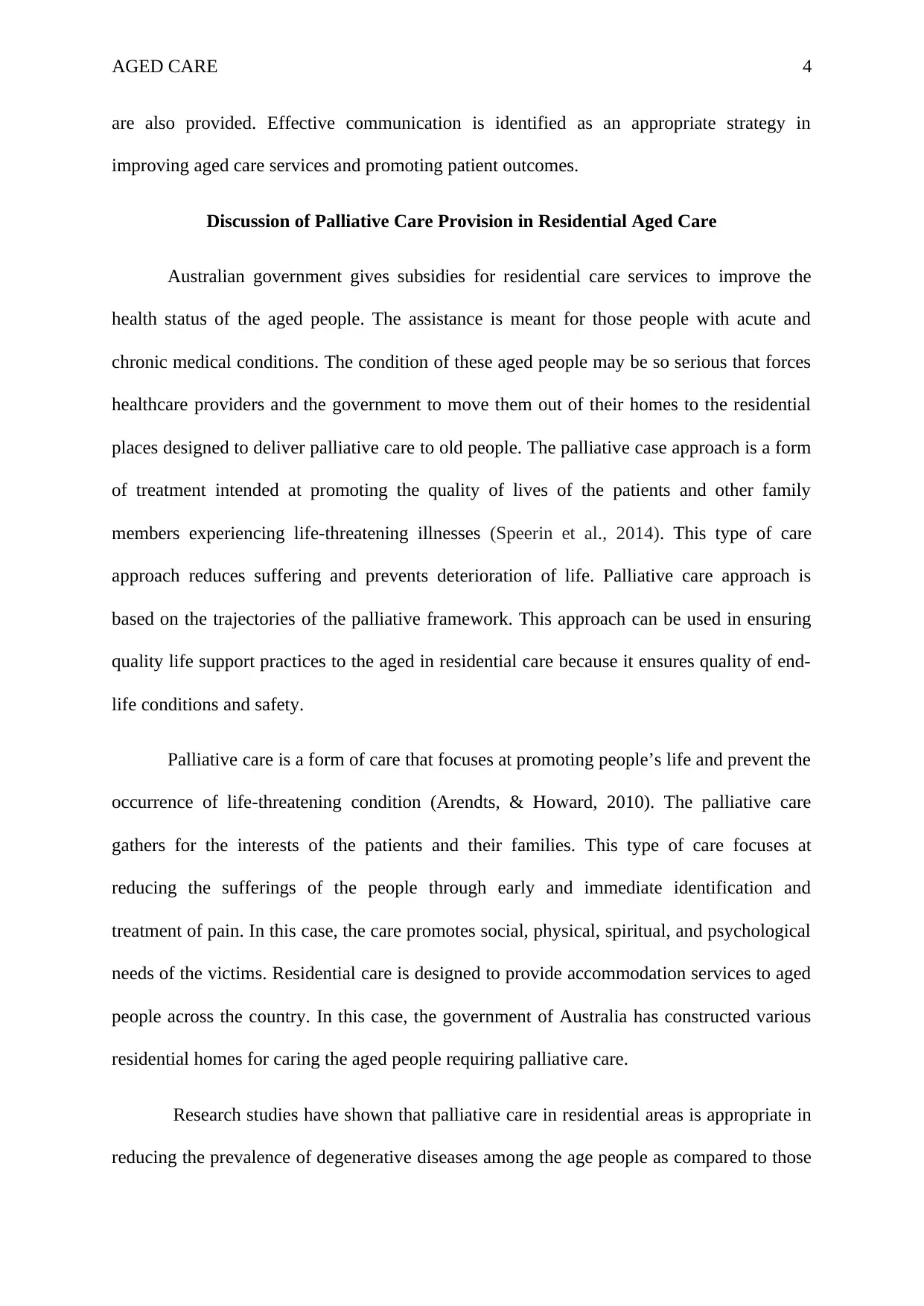
AGED CARE 4
are also provided. Effective communication is identified as an appropriate strategy in
improving aged care services and promoting patient outcomes.
Discussion of Palliative Care Provision in Residential Aged Care
Australian government gives subsidies for residential care services to improve the
health status of the aged people. The assistance is meant for those people with acute and
chronic medical conditions. The condition of these aged people may be so serious that forces
healthcare providers and the government to move them out of their homes to the residential
places designed to deliver palliative care to old people. The palliative case approach is a form
of treatment intended at promoting the quality of lives of the patients and other family
members experiencing life-threatening illnesses (Speerin et al., 2014). This type of care
approach reduces suffering and prevents deterioration of life. Palliative care approach is
based on the trajectories of the palliative framework. This approach can be used in ensuring
quality life support practices to the aged in residential care because it ensures quality of end-
life conditions and safety.
Palliative care is a form of care that focuses at promoting people’s life and prevent the
occurrence of life-threatening condition (Arendts, & Howard, 2010). The palliative care
gathers for the interests of the patients and their families. This type of care focuses at
reducing the sufferings of the people through early and immediate identification and
treatment of pain. In this case, the care promotes social, physical, spiritual, and psychological
needs of the victims. Residential care is designed to provide accommodation services to aged
people across the country. In this case, the government of Australia has constructed various
residential homes for caring the aged people requiring palliative care.
Research studies have shown that palliative care in residential areas is appropriate in
reducing the prevalence of degenerative diseases among the age people as compared to those
are also provided. Effective communication is identified as an appropriate strategy in
improving aged care services and promoting patient outcomes.
Discussion of Palliative Care Provision in Residential Aged Care
Australian government gives subsidies for residential care services to improve the
health status of the aged people. The assistance is meant for those people with acute and
chronic medical conditions. The condition of these aged people may be so serious that forces
healthcare providers and the government to move them out of their homes to the residential
places designed to deliver palliative care to old people. The palliative case approach is a form
of treatment intended at promoting the quality of lives of the patients and other family
members experiencing life-threatening illnesses (Speerin et al., 2014). This type of care
approach reduces suffering and prevents deterioration of life. Palliative care approach is
based on the trajectories of the palliative framework. This approach can be used in ensuring
quality life support practices to the aged in residential care because it ensures quality of end-
life conditions and safety.
Palliative care is a form of care that focuses at promoting people’s life and prevent the
occurrence of life-threatening condition (Arendts, & Howard, 2010). The palliative care
gathers for the interests of the patients and their families. This type of care focuses at
reducing the sufferings of the people through early and immediate identification and
treatment of pain. In this case, the care promotes social, physical, spiritual, and psychological
needs of the victims. Residential care is designed to provide accommodation services to aged
people across the country. In this case, the government of Australia has constructed various
residential homes for caring the aged people requiring palliative care.
Research studies have shown that palliative care in residential areas is appropriate in
reducing the prevalence of degenerative diseases among the age people as compared to those
Paraphrase This Document
Need a fresh take? Get an instant paraphrase of this document with our AI Paraphraser
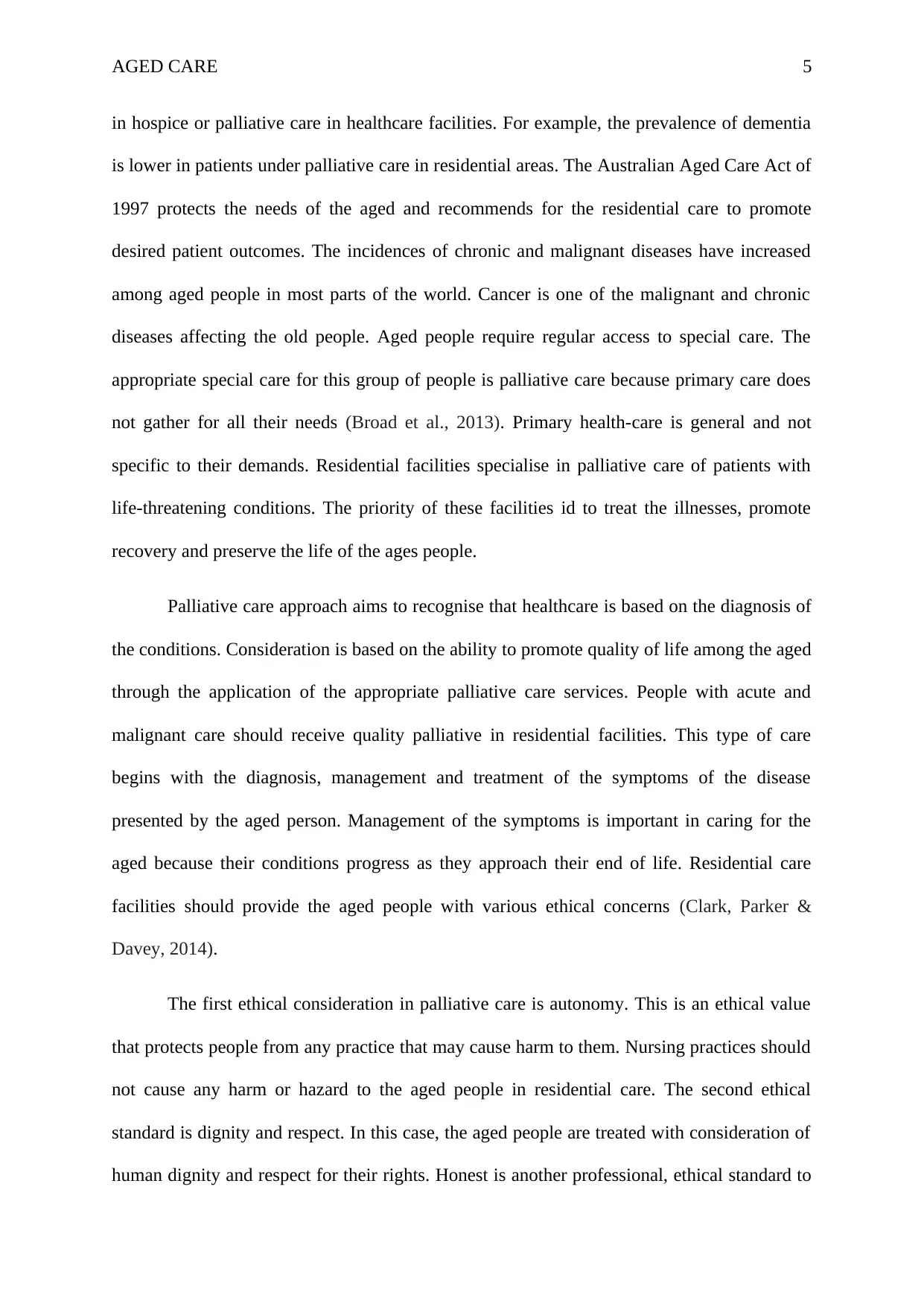
AGED CARE 5
in hospice or palliative care in healthcare facilities. For example, the prevalence of dementia
is lower in patients under palliative care in residential areas. The Australian Aged Care Act of
1997 protects the needs of the aged and recommends for the residential care to promote
desired patient outcomes. The incidences of chronic and malignant diseases have increased
among aged people in most parts of the world. Cancer is one of the malignant and chronic
diseases affecting the old people. Aged people require regular access to special care. The
appropriate special care for this group of people is palliative care because primary care does
not gather for all their needs (Broad et al., 2013). Primary health-care is general and not
specific to their demands. Residential facilities specialise in palliative care of patients with
life-threatening conditions. The priority of these facilities id to treat the illnesses, promote
recovery and preserve the life of the ages people.
Palliative care approach aims to recognise that healthcare is based on the diagnosis of
the conditions. Consideration is based on the ability to promote quality of life among the aged
through the application of the appropriate palliative care services. People with acute and
malignant care should receive quality palliative in residential facilities. This type of care
begins with the diagnosis, management and treatment of the symptoms of the disease
presented by the aged person. Management of the symptoms is important in caring for the
aged because their conditions progress as they approach their end of life. Residential care
facilities should provide the aged people with various ethical concerns (Clark, Parker &
Davey, 2014).
The first ethical consideration in palliative care is autonomy. This is an ethical value
that protects people from any practice that may cause harm to them. Nursing practices should
not cause any harm or hazard to the aged people in residential care. The second ethical
standard is dignity and respect. In this case, the aged people are treated with consideration of
human dignity and respect for their rights. Honest is another professional, ethical standard to
in hospice or palliative care in healthcare facilities. For example, the prevalence of dementia
is lower in patients under palliative care in residential areas. The Australian Aged Care Act of
1997 protects the needs of the aged and recommends for the residential care to promote
desired patient outcomes. The incidences of chronic and malignant diseases have increased
among aged people in most parts of the world. Cancer is one of the malignant and chronic
diseases affecting the old people. Aged people require regular access to special care. The
appropriate special care for this group of people is palliative care because primary care does
not gather for all their needs (Broad et al., 2013). Primary health-care is general and not
specific to their demands. Residential facilities specialise in palliative care of patients with
life-threatening conditions. The priority of these facilities id to treat the illnesses, promote
recovery and preserve the life of the ages people.
Palliative care approach aims to recognise that healthcare is based on the diagnosis of
the conditions. Consideration is based on the ability to promote quality of life among the aged
through the application of the appropriate palliative care services. People with acute and
malignant care should receive quality palliative in residential facilities. This type of care
begins with the diagnosis, management and treatment of the symptoms of the disease
presented by the aged person. Management of the symptoms is important in caring for the
aged because their conditions progress as they approach their end of life. Residential care
facilities should provide the aged people with various ethical concerns (Clark, Parker &
Davey, 2014).
The first ethical consideration in palliative care is autonomy. This is an ethical value
that protects people from any practice that may cause harm to them. Nursing practices should
not cause any harm or hazard to the aged people in residential care. The second ethical
standard is dignity and respect. In this case, the aged people are treated with consideration of
human dignity and respect for their rights. Honest is another professional, ethical standard to
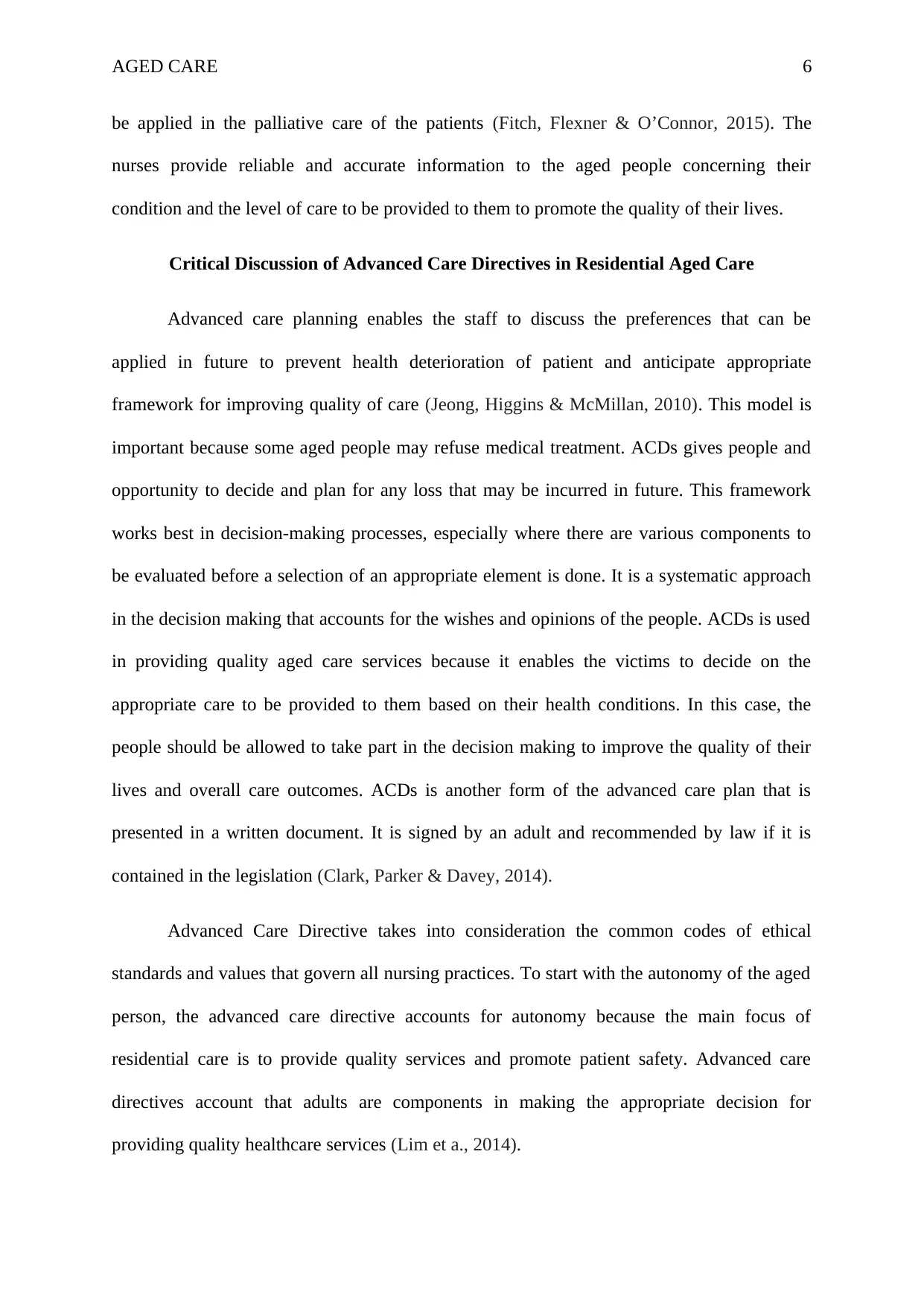
AGED CARE 6
be applied in the palliative care of the patients (Fitch, Flexner & O’Connor, 2015). The
nurses provide reliable and accurate information to the aged people concerning their
condition and the level of care to be provided to them to promote the quality of their lives.
Critical Discussion of Advanced Care Directives in Residential Aged Care
Advanced care planning enables the staff to discuss the preferences that can be
applied in future to prevent health deterioration of patient and anticipate appropriate
framework for improving quality of care (Jeong, Higgins & McMillan, 2010). This model is
important because some aged people may refuse medical treatment. ACDs gives people and
opportunity to decide and plan for any loss that may be incurred in future. This framework
works best in decision-making processes, especially where there are various components to
be evaluated before a selection of an appropriate element is done. It is a systematic approach
in the decision making that accounts for the wishes and opinions of the people. ACDs is used
in providing quality aged care services because it enables the victims to decide on the
appropriate care to be provided to them based on their health conditions. In this case, the
people should be allowed to take part in the decision making to improve the quality of their
lives and overall care outcomes. ACDs is another form of the advanced care plan that is
presented in a written document. It is signed by an adult and recommended by law if it is
contained in the legislation (Clark, Parker & Davey, 2014).
Advanced Care Directive takes into consideration the common codes of ethical
standards and values that govern all nursing practices. To start with the autonomy of the aged
person, the advanced care directive accounts for autonomy because the main focus of
residential care is to provide quality services and promote patient safety. Advanced care
directives account that adults are components in making the appropriate decision for
providing quality healthcare services (Lim et a., 2014).
be applied in the palliative care of the patients (Fitch, Flexner & O’Connor, 2015). The
nurses provide reliable and accurate information to the aged people concerning their
condition and the level of care to be provided to them to promote the quality of their lives.
Critical Discussion of Advanced Care Directives in Residential Aged Care
Advanced care planning enables the staff to discuss the preferences that can be
applied in future to prevent health deterioration of patient and anticipate appropriate
framework for improving quality of care (Jeong, Higgins & McMillan, 2010). This model is
important because some aged people may refuse medical treatment. ACDs gives people and
opportunity to decide and plan for any loss that may be incurred in future. This framework
works best in decision-making processes, especially where there are various components to
be evaluated before a selection of an appropriate element is done. It is a systematic approach
in the decision making that accounts for the wishes and opinions of the people. ACDs is used
in providing quality aged care services because it enables the victims to decide on the
appropriate care to be provided to them based on their health conditions. In this case, the
people should be allowed to take part in the decision making to improve the quality of their
lives and overall care outcomes. ACDs is another form of the advanced care plan that is
presented in a written document. It is signed by an adult and recommended by law if it is
contained in the legislation (Clark, Parker & Davey, 2014).
Advanced Care Directive takes into consideration the common codes of ethical
standards and values that govern all nursing practices. To start with the autonomy of the aged
person, the advanced care directive accounts for autonomy because the main focus of
residential care is to provide quality services and promote patient safety. Advanced care
directives account that adults are components in making the appropriate decision for
providing quality healthcare services (Lim et a., 2014).
⊘ This is a preview!⊘
Do you want full access?
Subscribe today to unlock all pages.

Trusted by 1+ million students worldwide
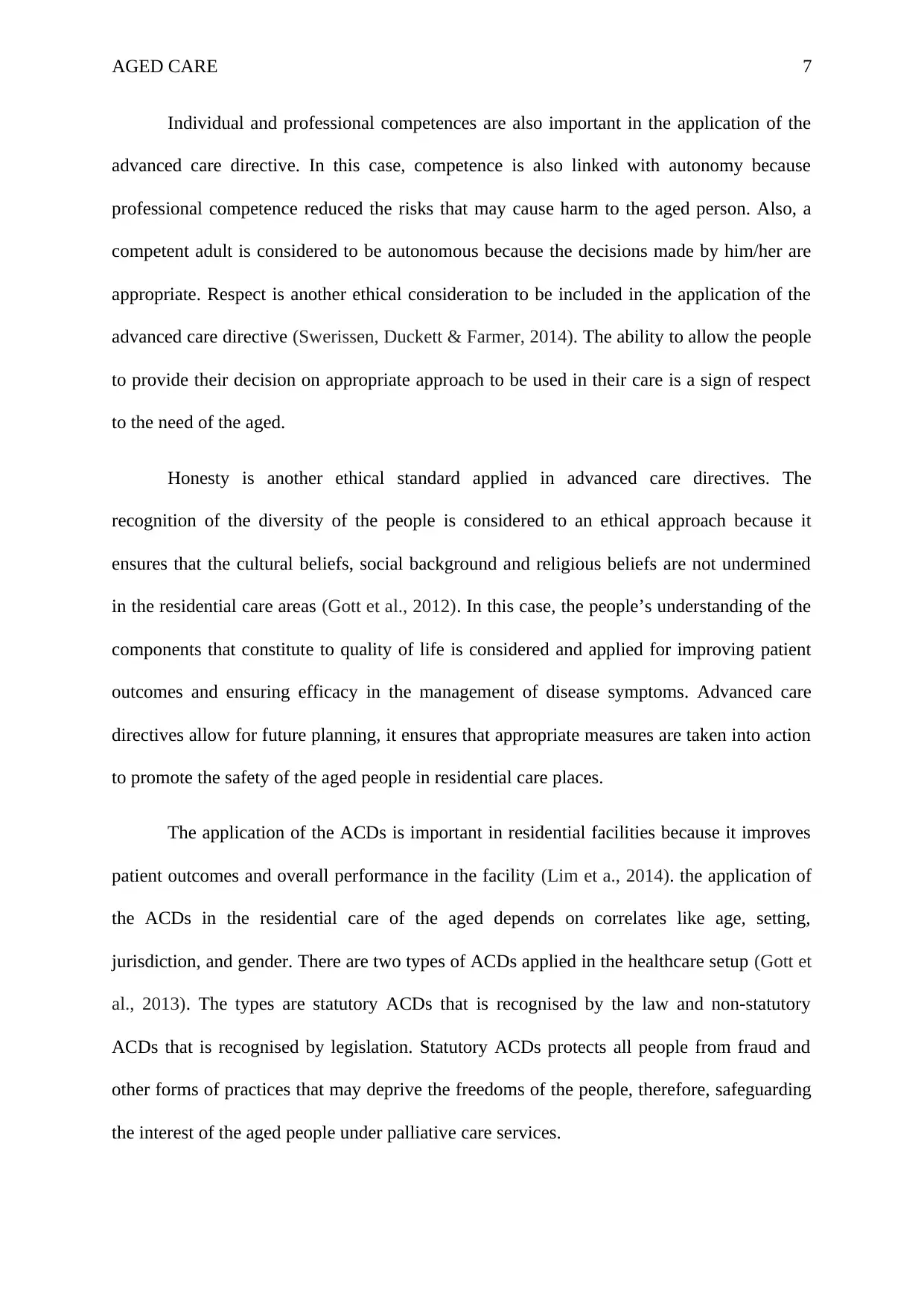
AGED CARE 7
Individual and professional competences are also important in the application of the
advanced care directive. In this case, competence is also linked with autonomy because
professional competence reduced the risks that may cause harm to the aged person. Also, a
competent adult is considered to be autonomous because the decisions made by him/her are
appropriate. Respect is another ethical consideration to be included in the application of the
advanced care directive (Swerissen, Duckett & Farmer, 2014). The ability to allow the people
to provide their decision on appropriate approach to be used in their care is a sign of respect
to the need of the aged.
Honesty is another ethical standard applied in advanced care directives. The
recognition of the diversity of the people is considered to an ethical approach because it
ensures that the cultural beliefs, social background and religious beliefs are not undermined
in the residential care areas (Gott et al., 2012). In this case, the people’s understanding of the
components that constitute to quality of life is considered and applied for improving patient
outcomes and ensuring efficacy in the management of disease symptoms. Advanced care
directives allow for future planning, it ensures that appropriate measures are taken into action
to promote the safety of the aged people in residential care places.
The application of the ACDs is important in residential facilities because it improves
patient outcomes and overall performance in the facility (Lim et a., 2014). the application of
the ACDs in the residential care of the aged depends on correlates like age, setting,
jurisdiction, and gender. There are two types of ACDs applied in the healthcare setup (Gott et
al., 2013). The types are statutory ACDs that is recognised by the law and non-statutory
ACDs that is recognised by legislation. Statutory ACDs protects all people from fraud and
other forms of practices that may deprive the freedoms of the people, therefore, safeguarding
the interest of the aged people under palliative care services.
Individual and professional competences are also important in the application of the
advanced care directive. In this case, competence is also linked with autonomy because
professional competence reduced the risks that may cause harm to the aged person. Also, a
competent adult is considered to be autonomous because the decisions made by him/her are
appropriate. Respect is another ethical consideration to be included in the application of the
advanced care directive (Swerissen, Duckett & Farmer, 2014). The ability to allow the people
to provide their decision on appropriate approach to be used in their care is a sign of respect
to the need of the aged.
Honesty is another ethical standard applied in advanced care directives. The
recognition of the diversity of the people is considered to an ethical approach because it
ensures that the cultural beliefs, social background and religious beliefs are not undermined
in the residential care areas (Gott et al., 2012). In this case, the people’s understanding of the
components that constitute to quality of life is considered and applied for improving patient
outcomes and ensuring efficacy in the management of disease symptoms. Advanced care
directives allow for future planning, it ensures that appropriate measures are taken into action
to promote the safety of the aged people in residential care places.
The application of the ACDs is important in residential facilities because it improves
patient outcomes and overall performance in the facility (Lim et a., 2014). the application of
the ACDs in the residential care of the aged depends on correlates like age, setting,
jurisdiction, and gender. There are two types of ACDs applied in the healthcare setup (Gott et
al., 2013). The types are statutory ACDs that is recognised by the law and non-statutory
ACDs that is recognised by legislation. Statutory ACDs protects all people from fraud and
other forms of practices that may deprive the freedoms of the people, therefore, safeguarding
the interest of the aged people under palliative care services.
Paraphrase This Document
Need a fresh take? Get an instant paraphrase of this document with our AI Paraphraser
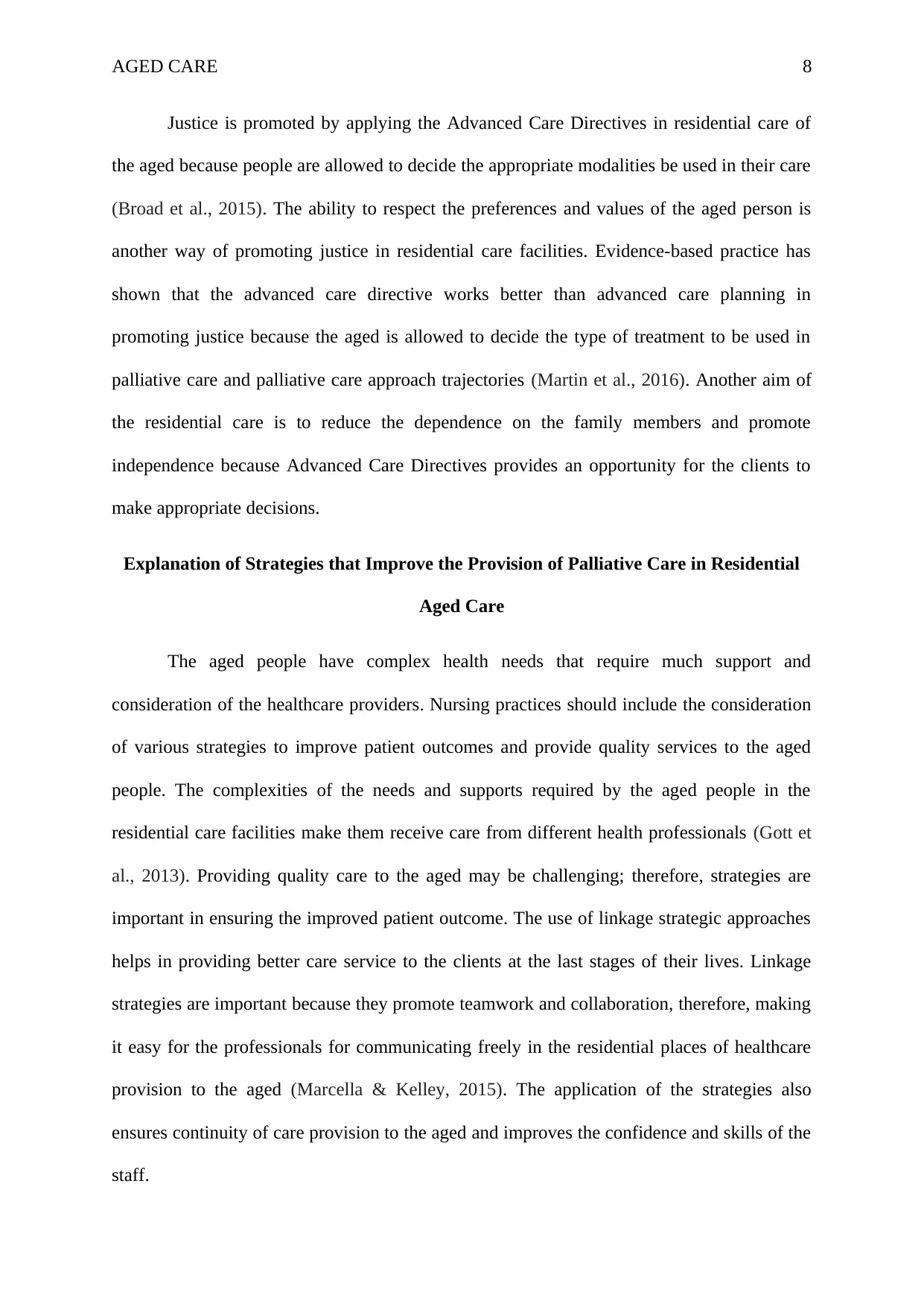
AGED CARE 8
Justice is promoted by applying the Advanced Care Directives in residential care of
the aged because people are allowed to decide the appropriate modalities be used in their care
(Broad et al., 2015). The ability to respect the preferences and values of the aged person is
another way of promoting justice in residential care facilities. Evidence-based practice has
shown that the advanced care directive works better than advanced care planning in
promoting justice because the aged is allowed to decide the type of treatment to be used in
palliative care and palliative care approach trajectories (Martin et al., 2016). Another aim of
the residential care is to reduce the dependence on the family members and promote
independence because Advanced Care Directives provides an opportunity for the clients to
make appropriate decisions.
Explanation of Strategies that Improve the Provision of Palliative Care in Residential
Aged Care
The aged people have complex health needs that require much support and
consideration of the healthcare providers. Nursing practices should include the consideration
of various strategies to improve patient outcomes and provide quality services to the aged
people. The complexities of the needs and supports required by the aged people in the
residential care facilities make them receive care from different health professionals (Gott et
al., 2013). Providing quality care to the aged may be challenging; therefore, strategies are
important in ensuring the improved patient outcome. The use of linkage strategic approaches
helps in providing better care service to the clients at the last stages of their lives. Linkage
strategies are important because they promote teamwork and collaboration, therefore, making
it easy for the professionals for communicating freely in the residential places of healthcare
provision to the aged (Marcella & Kelley, 2015). The application of the strategies also
ensures continuity of care provision to the aged and improves the confidence and skills of the
staff.
Justice is promoted by applying the Advanced Care Directives in residential care of
the aged because people are allowed to decide the appropriate modalities be used in their care
(Broad et al., 2015). The ability to respect the preferences and values of the aged person is
another way of promoting justice in residential care facilities. Evidence-based practice has
shown that the advanced care directive works better than advanced care planning in
promoting justice because the aged is allowed to decide the type of treatment to be used in
palliative care and palliative care approach trajectories (Martin et al., 2016). Another aim of
the residential care is to reduce the dependence on the family members and promote
independence because Advanced Care Directives provides an opportunity for the clients to
make appropriate decisions.
Explanation of Strategies that Improve the Provision of Palliative Care in Residential
Aged Care
The aged people have complex health needs that require much support and
consideration of the healthcare providers. Nursing practices should include the consideration
of various strategies to improve patient outcomes and provide quality services to the aged
people. The complexities of the needs and supports required by the aged people in the
residential care facilities make them receive care from different health professionals (Gott et
al., 2013). Providing quality care to the aged may be challenging; therefore, strategies are
important in ensuring the improved patient outcome. The use of linkage strategic approaches
helps in providing better care service to the clients at the last stages of their lives. Linkage
strategies are important because they promote teamwork and collaboration, therefore, making
it easy for the professionals for communicating freely in the residential places of healthcare
provision to the aged (Marcella & Kelley, 2015). The application of the strategies also
ensures continuity of care provision to the aged and improves the confidence and skills of the
staff.
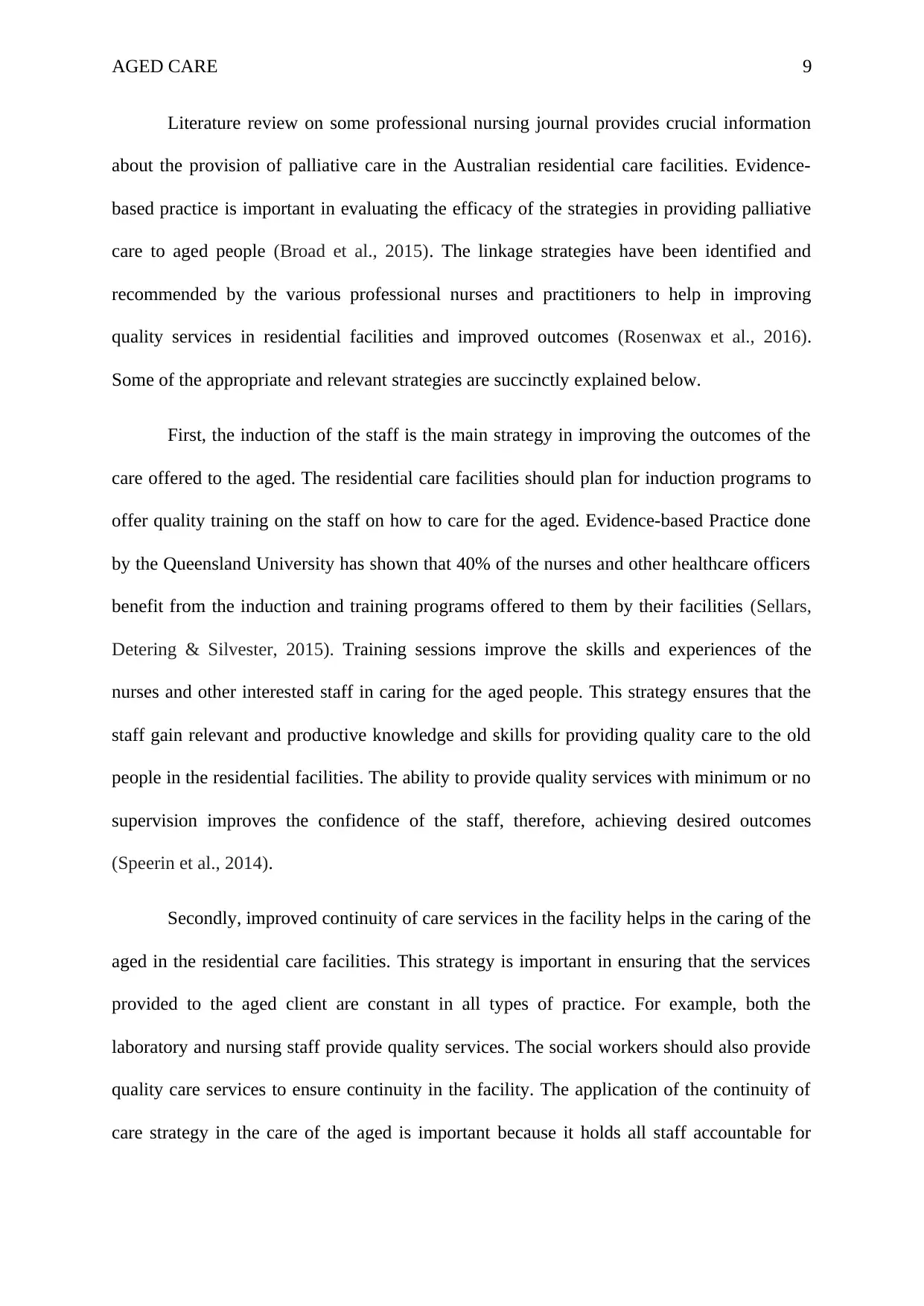
AGED CARE 9
Literature review on some professional nursing journal provides crucial information
about the provision of palliative care in the Australian residential care facilities. Evidence-
based practice is important in evaluating the efficacy of the strategies in providing palliative
care to aged people (Broad et al., 2015). The linkage strategies have been identified and
recommended by the various professional nurses and practitioners to help in improving
quality services in residential facilities and improved outcomes (Rosenwax et al., 2016).
Some of the appropriate and relevant strategies are succinctly explained below.
First, the induction of the staff is the main strategy in improving the outcomes of the
care offered to the aged. The residential care facilities should plan for induction programs to
offer quality training on the staff on how to care for the aged. Evidence-based Practice done
by the Queensland University has shown that 40% of the nurses and other healthcare officers
benefit from the induction and training programs offered to them by their facilities (Sellars,
Detering & Silvester, 2015). Training sessions improve the skills and experiences of the
nurses and other interested staff in caring for the aged people. This strategy ensures that the
staff gain relevant and productive knowledge and skills for providing quality care to the old
people in the residential facilities. The ability to provide quality services with minimum or no
supervision improves the confidence of the staff, therefore, achieving desired outcomes
(Speerin et al., 2014).
Secondly, improved continuity of care services in the facility helps in the caring of the
aged in the residential care facilities. This strategy is important in ensuring that the services
provided to the aged client are constant in all types of practice. For example, both the
laboratory and nursing staff provide quality services. The social workers should also provide
quality care services to ensure continuity in the facility. The application of the continuity of
care strategy in the care of the aged is important because it holds all staff accountable for
Literature review on some professional nursing journal provides crucial information
about the provision of palliative care in the Australian residential care facilities. Evidence-
based practice is important in evaluating the efficacy of the strategies in providing palliative
care to aged people (Broad et al., 2015). The linkage strategies have been identified and
recommended by the various professional nurses and practitioners to help in improving
quality services in residential facilities and improved outcomes (Rosenwax et al., 2016).
Some of the appropriate and relevant strategies are succinctly explained below.
First, the induction of the staff is the main strategy in improving the outcomes of the
care offered to the aged. The residential care facilities should plan for induction programs to
offer quality training on the staff on how to care for the aged. Evidence-based Practice done
by the Queensland University has shown that 40% of the nurses and other healthcare officers
benefit from the induction and training programs offered to them by their facilities (Sellars,
Detering & Silvester, 2015). Training sessions improve the skills and experiences of the
nurses and other interested staff in caring for the aged people. This strategy ensures that the
staff gain relevant and productive knowledge and skills for providing quality care to the old
people in the residential facilities. The ability to provide quality services with minimum or no
supervision improves the confidence of the staff, therefore, achieving desired outcomes
(Speerin et al., 2014).
Secondly, improved continuity of care services in the facility helps in the caring of the
aged in the residential care facilities. This strategy is important in ensuring that the services
provided to the aged client are constant in all types of practice. For example, both the
laboratory and nursing staff provide quality services. The social workers should also provide
quality care services to ensure continuity in the facility. The application of the continuity of
care strategy in the care of the aged is important because it holds all staff accountable for
⊘ This is a preview!⊘
Do you want full access?
Subscribe today to unlock all pages.

Trusted by 1+ million students worldwide
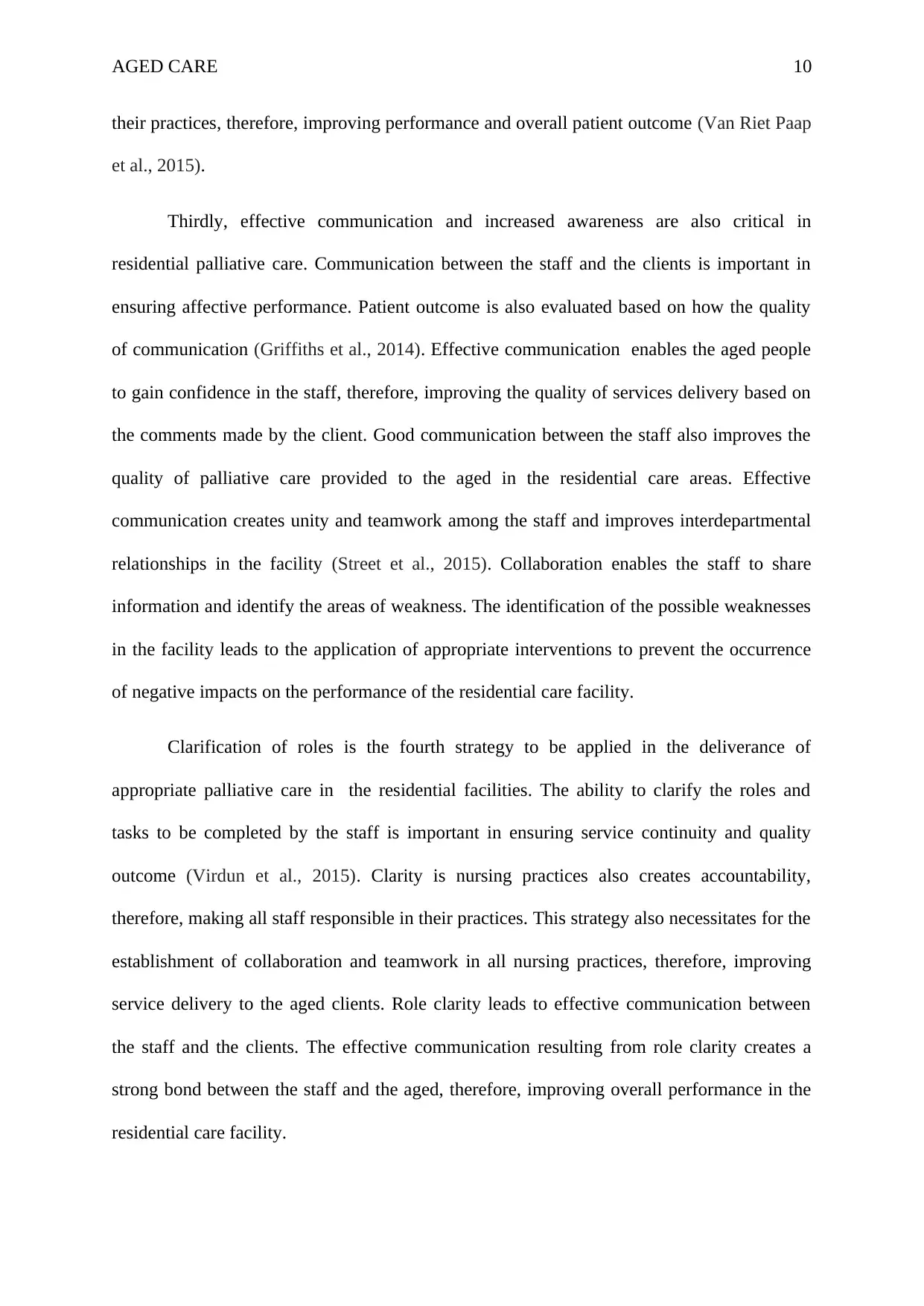
AGED CARE 10
their practices, therefore, improving performance and overall patient outcome (Van Riet Paap
et al., 2015).
Thirdly, effective communication and increased awareness are also critical in
residential palliative care. Communication between the staff and the clients is important in
ensuring affective performance. Patient outcome is also evaluated based on how the quality
of communication (Griffiths et al., 2014). Effective communication enables the aged people
to gain confidence in the staff, therefore, improving the quality of services delivery based on
the comments made by the client. Good communication between the staff also improves the
quality of palliative care provided to the aged in the residential care areas. Effective
communication creates unity and teamwork among the staff and improves interdepartmental
relationships in the facility (Street et al., 2015). Collaboration enables the staff to share
information and identify the areas of weakness. The identification of the possible weaknesses
in the facility leads to the application of appropriate interventions to prevent the occurrence
of negative impacts on the performance of the residential care facility.
Clarification of roles is the fourth strategy to be applied in the deliverance of
appropriate palliative care in the residential facilities. The ability to clarify the roles and
tasks to be completed by the staff is important in ensuring service continuity and quality
outcome (Virdun et al., 2015). Clarity is nursing practices also creates accountability,
therefore, making all staff responsible in their practices. This strategy also necessitates for the
establishment of collaboration and teamwork in all nursing practices, therefore, improving
service delivery to the aged clients. Role clarity leads to effective communication between
the staff and the clients. The effective communication resulting from role clarity creates a
strong bond between the staff and the aged, therefore, improving overall performance in the
residential care facility.
their practices, therefore, improving performance and overall patient outcome (Van Riet Paap
et al., 2015).
Thirdly, effective communication and increased awareness are also critical in
residential palliative care. Communication between the staff and the clients is important in
ensuring affective performance. Patient outcome is also evaluated based on how the quality
of communication (Griffiths et al., 2014). Effective communication enables the aged people
to gain confidence in the staff, therefore, improving the quality of services delivery based on
the comments made by the client. Good communication between the staff also improves the
quality of palliative care provided to the aged in the residential care areas. Effective
communication creates unity and teamwork among the staff and improves interdepartmental
relationships in the facility (Street et al., 2015). Collaboration enables the staff to share
information and identify the areas of weakness. The identification of the possible weaknesses
in the facility leads to the application of appropriate interventions to prevent the occurrence
of negative impacts on the performance of the residential care facility.
Clarification of roles is the fourth strategy to be applied in the deliverance of
appropriate palliative care in the residential facilities. The ability to clarify the roles and
tasks to be completed by the staff is important in ensuring service continuity and quality
outcome (Virdun et al., 2015). Clarity is nursing practices also creates accountability,
therefore, making all staff responsible in their practices. This strategy also necessitates for the
establishment of collaboration and teamwork in all nursing practices, therefore, improving
service delivery to the aged clients. Role clarity leads to effective communication between
the staff and the clients. The effective communication resulting from role clarity creates a
strong bond between the staff and the aged, therefore, improving overall performance in the
residential care facility.
Paraphrase This Document
Need a fresh take? Get an instant paraphrase of this document with our AI Paraphraser
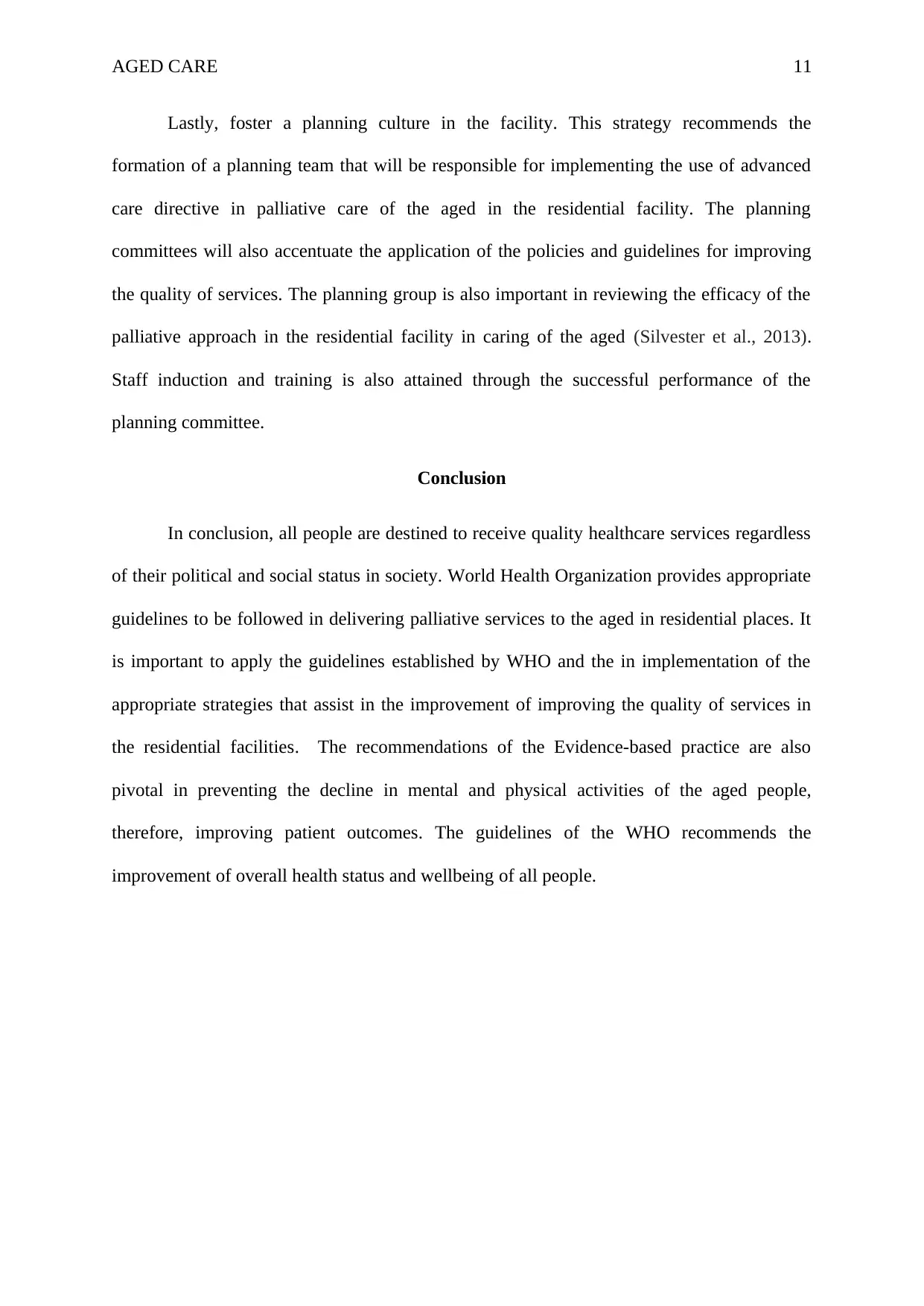
AGED CARE 11
Lastly, foster a planning culture in the facility. This strategy recommends the
formation of a planning team that will be responsible for implementing the use of advanced
care directive in palliative care of the aged in the residential facility. The planning
committees will also accentuate the application of the policies and guidelines for improving
the quality of services. The planning group is also important in reviewing the efficacy of the
palliative approach in the residential facility in caring of the aged (Silvester et al., 2013).
Staff induction and training is also attained through the successful performance of the
planning committee.
Conclusion
In conclusion, all people are destined to receive quality healthcare services regardless
of their political and social status in society. World Health Organization provides appropriate
guidelines to be followed in delivering palliative services to the aged in residential places. It
is important to apply the guidelines established by WHO and the in implementation of the
appropriate strategies that assist in the improvement of improving the quality of services in
the residential facilities. The recommendations of the Evidence-based practice are also
pivotal in preventing the decline in mental and physical activities of the aged people,
therefore, improving patient outcomes. The guidelines of the WHO recommends the
improvement of overall health status and wellbeing of all people.
Lastly, foster a planning culture in the facility. This strategy recommends the
formation of a planning team that will be responsible for implementing the use of advanced
care directive in palliative care of the aged in the residential facility. The planning
committees will also accentuate the application of the policies and guidelines for improving
the quality of services. The planning group is also important in reviewing the efficacy of the
palliative approach in the residential facility in caring of the aged (Silvester et al., 2013).
Staff induction and training is also attained through the successful performance of the
planning committee.
Conclusion
In conclusion, all people are destined to receive quality healthcare services regardless
of their political and social status in society. World Health Organization provides appropriate
guidelines to be followed in delivering palliative services to the aged in residential places. It
is important to apply the guidelines established by WHO and the in implementation of the
appropriate strategies that assist in the improvement of improving the quality of services in
the residential facilities. The recommendations of the Evidence-based practice are also
pivotal in preventing the decline in mental and physical activities of the aged people,
therefore, improving patient outcomes. The guidelines of the WHO recommends the
improvement of overall health status and wellbeing of all people.
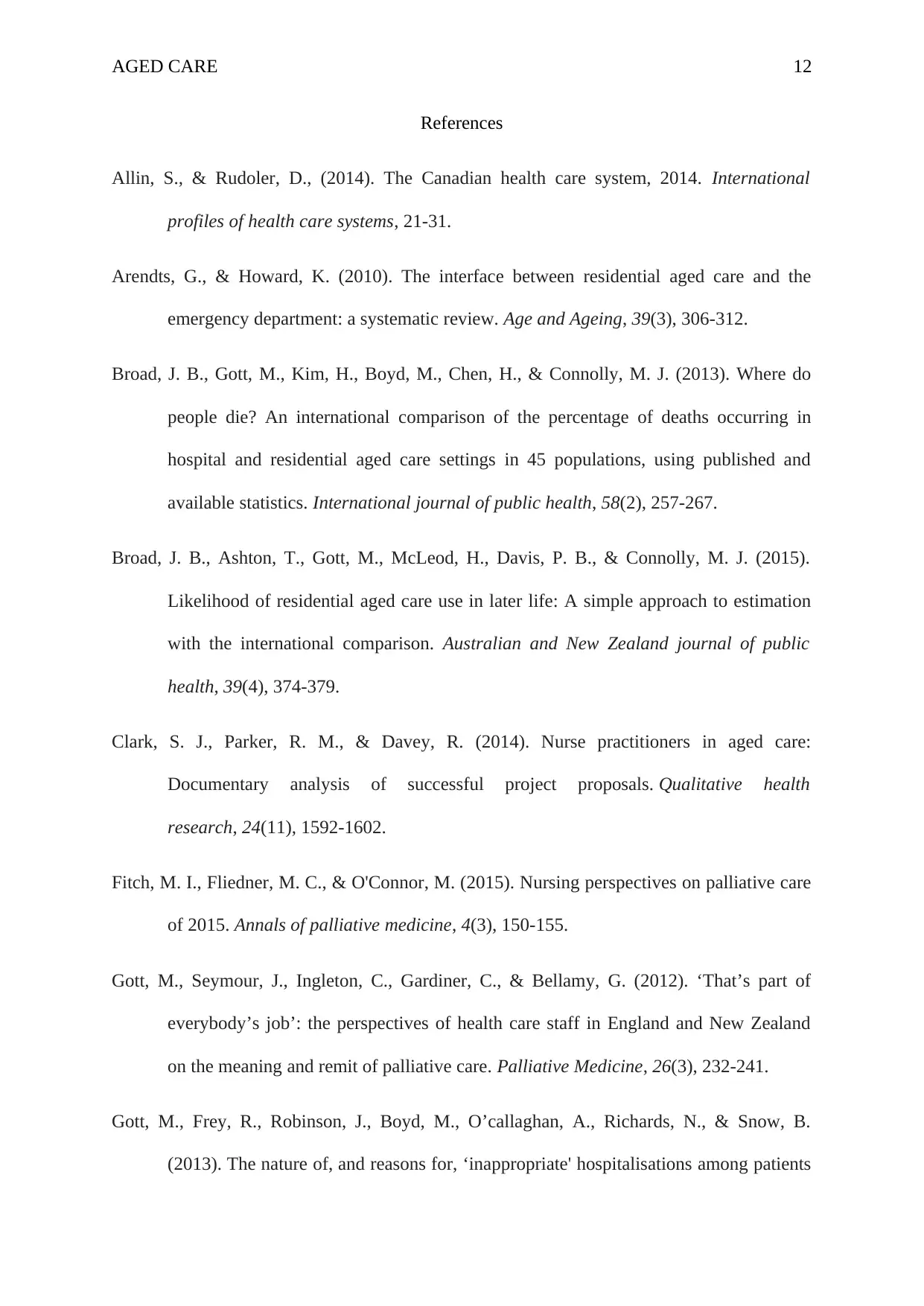
AGED CARE 12
References
Allin, S., & Rudoler, D., (2014). The Canadian health care system, 2014. International
profiles of health care systems, 21-31.
Arendts, G., & Howard, K. (2010). The interface between residential aged care and the
emergency department: a systematic review. Age and Ageing, 39(3), 306-312.
Broad, J. B., Gott, M., Kim, H., Boyd, M., Chen, H., & Connolly, M. J. (2013). Where do
people die? An international comparison of the percentage of deaths occurring in
hospital and residential aged care settings in 45 populations, using published and
available statistics. International journal of public health, 58(2), 257-267.
Broad, J. B., Ashton, T., Gott, M., McLeod, H., Davis, P. B., & Connolly, M. J. (2015).
Likelihood of residential aged care use in later life: A simple approach to estimation
with the international comparison. Australian and New Zealand journal of public
health, 39(4), 374-379.
Clark, S. J., Parker, R. M., & Davey, R. (2014). Nurse practitioners in aged care:
Documentary analysis of successful project proposals. Qualitative health
research, 24(11), 1592-1602.
Fitch, M. I., Fliedner, M. C., & O'Connor, M. (2015). Nursing perspectives on palliative care
of 2015. Annals of palliative medicine, 4(3), 150-155.
Gott, M., Seymour, J., Ingleton, C., Gardiner, C., & Bellamy, G. (2012). ‘That’s part of
everybody’s job’: the perspectives of health care staff in England and New Zealand
on the meaning and remit of palliative care. Palliative Medicine, 26(3), 232-241.
Gott, M., Frey, R., Robinson, J., Boyd, M., O’callaghan, A., Richards, N., & Snow, B.
(2013). The nature of, and reasons for, ‘inappropriate' hospitalisations among patients
References
Allin, S., & Rudoler, D., (2014). The Canadian health care system, 2014. International
profiles of health care systems, 21-31.
Arendts, G., & Howard, K. (2010). The interface between residential aged care and the
emergency department: a systematic review. Age and Ageing, 39(3), 306-312.
Broad, J. B., Gott, M., Kim, H., Boyd, M., Chen, H., & Connolly, M. J. (2013). Where do
people die? An international comparison of the percentage of deaths occurring in
hospital and residential aged care settings in 45 populations, using published and
available statistics. International journal of public health, 58(2), 257-267.
Broad, J. B., Ashton, T., Gott, M., McLeod, H., Davis, P. B., & Connolly, M. J. (2015).
Likelihood of residential aged care use in later life: A simple approach to estimation
with the international comparison. Australian and New Zealand journal of public
health, 39(4), 374-379.
Clark, S. J., Parker, R. M., & Davey, R. (2014). Nurse practitioners in aged care:
Documentary analysis of successful project proposals. Qualitative health
research, 24(11), 1592-1602.
Fitch, M. I., Fliedner, M. C., & O'Connor, M. (2015). Nursing perspectives on palliative care
of 2015. Annals of palliative medicine, 4(3), 150-155.
Gott, M., Seymour, J., Ingleton, C., Gardiner, C., & Bellamy, G. (2012). ‘That’s part of
everybody’s job’: the perspectives of health care staff in England and New Zealand
on the meaning and remit of palliative care. Palliative Medicine, 26(3), 232-241.
Gott, M., Frey, R., Robinson, J., Boyd, M., O’callaghan, A., Richards, N., & Snow, B.
(2013). The nature of, and reasons for, ‘inappropriate' hospitalisations among patients
⊘ This is a preview!⊘
Do you want full access?
Subscribe today to unlock all pages.

Trusted by 1+ million students worldwide
1 out of 14
Related Documents
Your All-in-One AI-Powered Toolkit for Academic Success.
+13062052269
info@desklib.com
Available 24*7 on WhatsApp / Email
![[object Object]](/_next/static/media/star-bottom.7253800d.svg)
Unlock your academic potential
Copyright © 2020–2026 A2Z Services. All Rights Reserved. Developed and managed by ZUCOL.





